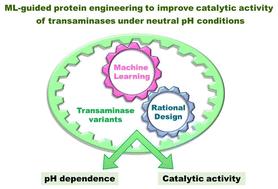Machine learning-guided protein engineering to improve the catalytic activity of transaminases under neutral pH conditions†
Organic chemistry frontiers : an international journal of organic chemistry
Pub Date : 2025-04-28
DOI:10.1039/d5qo00423c
引用次数: 0
Abstract
Biocatalysis provides an eco-friendly and efficient method for the synthesis of fine chemicals, pharmaceuticals, and biofuels. However, the catalytic performance of enzymes is greatly reduced when they react under non-optimal pH conditions. Despite efforts in protein engineering to improve enzymatic pH dependence, predicting and optimizing catalytic activity under various pH conditions remain challenging. Recent advancements in machine learning (ML) provide a promising solution by enabling data-driven predictions of enzyme properties, thus reducing the need for labor-intensive experiments. This study aims to enhance enzyme activity and regulate pH dependence through ML-guided protein engineering. Using a transaminase from Ruegeria sp. TM1040 as the mutation template, we first collected high-quality experimental data from a series of variants by measuring their activity under a series of pH conditions. Based on these data, we developed an ML model to predict catalytic activity under different pH conditions. This work provides a powerful ML tool to guide the rational design of variants, which showed improved activity (up to 3.7-fold compared to the starting variant) at pH 7.5, and offers a data-driven protein engineering strategy to achieve co-optimization of enzyme activity and pH dependence, demonstrating the potential of ML to accelerate enzyme engineering for industrial applications.

以机器学习为指导的蛋白质工程改善转氨酶在中性pH值条件下的催化活性
生物催化为精细化学品、药品和生物燃料的合成提供了一种环保高效的方法。然而,当酶在非最佳pH条件下反应时,酶的催化性能大大降低。尽管蛋白质工程努力改善酶的pH依赖性,但预测和优化不同pH条件下的催化活性仍然具有挑战性。机器学习(ML)的最新进展通过实现数据驱动的酶性质预测提供了一个有前途的解决方案,从而减少了对劳动密集型实验的需求。本研究旨在通过ml引导的蛋白质工程提高酶活性,调节pH依赖性。以鲁氏菌(Ruegeria sp. TM1040)的一种转氨酶为突变模板,首先通过测量其在一系列pH条件下的活性,收集了一系列高质量的实验数据。基于此,我们建立了一个ML模型来预测不同pH条件下的催化活性。这项工作提供了一个强大的ML工具来指导变异的合理设计,这些变异在pH 7.5条件下显示出更高的活性(与初始变异相比高达3.7倍),并提供了一个数据驱动的蛋白质工程策略来实现酶活性和pH依赖性的共同优化,展示了ML加速酶工程工业应用的潜力
本文章由计算机程序翻译,如有差异,请以英文原文为准。
求助全文
约1分钟内获得全文
求助全文
来源期刊
CiteScore
7.80
自引率
0.00%
发文量
0

 求助内容:
求助内容: 应助结果提醒方式:
应助结果提醒方式:


